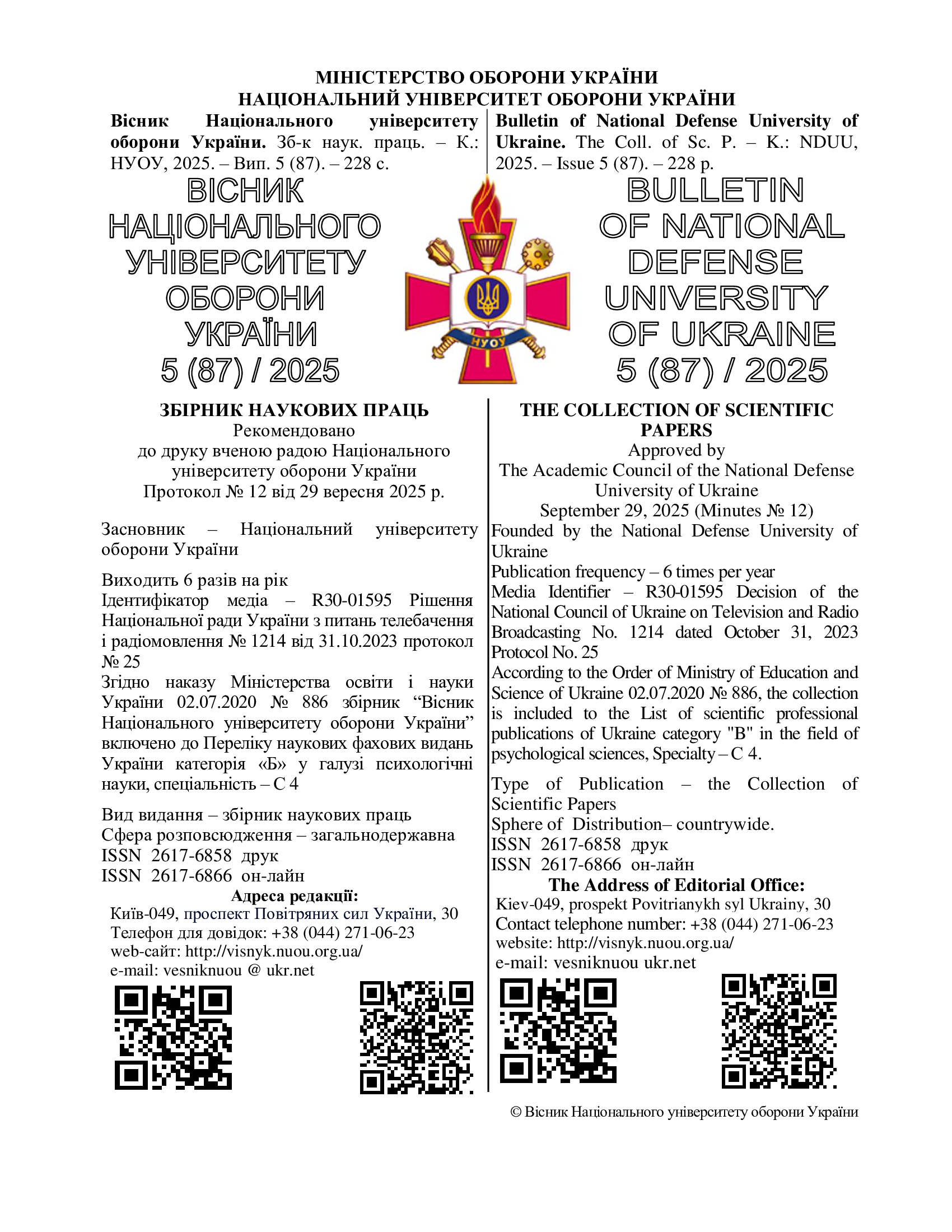ОСОБЛИВОСТІ ПРОЯВЛЕННЯ ПОСТТРАВМАТИЧНОГО СТРЕСУ У МОБІЛІЗОВАНИХ ВІЙСЬКОВОСЛУЖБОВЦІВ ПІСЛЯ УЧАСТІ В БОЙОВИХ ДІЯХ
DOI:
https://doi.org/10.33099/2617-6858-2025-87-5-101-111Ключові слова:
стрес, травматизація, бойовий стрес, мобілізовані військовослужбовці, посттравматичний стресовий розлад, військовослужбовці.Анотація
У статті подано результати дослідження особливостей проявлення посттравматичного стресу у військовослужбовців, призваних на військову службу за мобілізацією, після їх участі в бойових діях. Проведене дослідження підтверджує значну роль особистісних ресурсів, мотивації, емоційної регуляції та професійної підготовки у подоланні наслідків психічної травми, пов'язаної з бойовими діями, та запобіганні посттравматичному стресу у військовослужбовців. Військовослужбовці з різних кластерів, сформованих на основі бойового досвіду та зазнаючи однакової інтенсивності бойових дій, демонструють різне ставлення до пережитого посттравматичного стресу.
Завантаження
Посилання
Kucherenko N. S., & Prykhodko I. I. (2025). Theoretical foundations of traumatic stress in military personnel [Teoretychni osnovy travmatychnoho stresu viiskovosluzhbovtsiv]. Bulletin of the National University of Defense of Ukraine, 3(85), 118-124. https://doi.org/10.33099/2617-6858–25–85–3–118-124 (in Ukrainian)
Kolesnichenko O. S., Prykhodko I. I., Matsegora Ya. V., Yuryeva N. V., Lyman A. A., & Bayda M.S. (2020). Applied psychodiagnostics in the National Guard of Ukraine [Prykladna psykhodiahnostyka v Natsionalnii hvardii Ukrainy]. General editor. prof. I. I. Prykhodko. Kharkiv: NA NGU. (in Ukrainian)
Prykhodko I., Matsegora Ya., Kolesnichenko O., & Bayda M. (2017). Express questionnaire “Maladaptivity”: development, testing, psychometric indicators [Ekspres-opytuvalnyk «Dezadaptyvnist»: rozroblennia, aprobatsiia, psykhometrychni pokaznyky]. Bulletin of the National Academy of the State Border Service of Ukraine. electronic. scientific. professional. ed. Series: psychology, Issue. 3. URL: http://nbuv.gov.ua/UJRN/Vnadpn_2017_3_8. (in Ukrainian)
Prykhodko I. I., Matsegora Ya. V., & Kucherenko N. S. (2025). “Posttraumatic Stress Differentiation Questionnaire”: modification, testing, psychometric indicators [“Opytuvalnyk dyferentsiatsii posttravmatychnoho stresu”: modyfikatsiia, aprobatsiia, psykhometrychni pokaznyky]. Honor and Law, 1(92), 107-126. https://doi.org/10.33405/2078-7480/2025/1/92/332048 (in Ukrainian)
Adler, A. B., Start, A. R., Milham, L., Allard, Y. S., Riddle, D., Townsend, L., & Svetlitzky, V. (2020). Rapid response to acute stress reaction: Pilot test of iCOVER training for military units. Psychological trauma : theory, research, practice and policy, 12(4), 431–435. https://doi.org/10.1037/tra0000487
Bandura, A. (2001). Social cognitive theory: An agentic perspective. Annual Review of Psychology, 52, 1–26. https://doi.org/10.1146/annurev.psych.52.1.1
Berman, S. L., Montgomery, M. J., & Ratner, K. (2020). Trauma and identity: A reciprocal relationship?. Journal of adolescence, 79, 275–278. https://doi.org/10.1016/j.adolescence.2020.01.018
Castro, C. A., & Adler, A. B. (2011). “Military mental health training: Building resilience”. In Resilience and mental health: Challenges across the lifespan, Edited by: Southwick, S. M., Litz, B. T., Charney, D. and Friedman, M. J. 323–339. Cambridge, UK: Cambridge University Press.
Keane, T. M. & Barlow, D. H. (2002). Posttraumatic stress disorder. In Barlow, D. H. (Ed.), Anxiety and its disorders (2nd ed.; pp. 418–453). New York: Guilford.
Kokun, O., Aleshchenko, V., Osyodlo, V., Pischko, I., & Lozinska, N. (2024). Personality and Health in Military Context: A Study of Combatants and Injured Servicemen. Mental Health: Global Challenges Journal, 7(1), 71–80. https://doi.org/10.56508/mhgcj.v7i1.207
Litz, B. T. (2007). Research on the Impact of Military Trauma: Current Status and Future Directions. Military Psychology, 19(3), 217–238. https://doi.org/10.1080/08995600701386358
Macklin, M. L., Metzger, L. J., Litz, B. T., McNally, R. J., Lasko, N. B., Orr, S. P., & Pitman, R. K. (1998). Lower precombat intelligence is a risk factor for posttraumatic stress disorder. Journal of consulting and clinical psychology, 66(2), 323–326. https://doi.org/10.1037//0022-006x.66.2.323
Maguen, S., Litz, B. T., Wang, J. L., & Cook, M. (2004). The stressors and demands of peacekeeping in Kosovo: predictors of mental health response. Military medicine, 169(3), 198–206. https://doi.org/10.7205/milmed.169.3.198
Matsegora, Y., Kolesnichenko, O., Prykhodko, I., Marushchenko, K., Rumiantsev, Y., Tovma, I. Gakh, R., & Prikhodko, D. (2023). Peculiarities of Military Values of Combatants with Signs of Post-traumatic Stress Reactions and Moral Traumas. Romanian Journal of Military Medicine, 126(4), 378-390. https://doi.org/10.55453/rjmm.2023.126.4.6
Prykhodko, I. (2022). The model of psychological safety of a soldier’s personality. Current Issues in Personality Psychology, 10(2), 112-122. https://doi.org/10.5114/cipp.2021.108684
Prykhodko, I., Kolesnichenko, O., Matsehora, Y., Aleshchenko, V., Kovalchuk, O., Matsevko, T., Krotiuk, V., & Kuzina, V. (2022). Effects of posttraumatic stress and combat losses on the combatants’ resilience. Československá Psychologie, 66(2), 157-169. https://doi.org/10.51561/cspsych.66.2.157
Prykhodko, I., Matsehora, Y., Kolesnichenko, O., Baida, M., & Vasylkovskyi, O. (2023). The psychological recovery program of Ukrainian military personnel after completing combat missions in the Russian-Ukrainian War. Československá Psychologie, 67(6), 457-475. https://doi.org/10.51561/cspsych.67.6.455
Prykhodko, I., Matsehora,Y., Kolesnichenko, O., Voloshko, S., Vintoniak, V., Vasyukova, N., Budahiants, L., Kuzina, V., & Motyka, S. (2024). Combat Stress in Military Personnel: Theory, Genesis, Prevention, and Control. Romanian Journal of Military Medicine, 127(1), 15-24. https://doi.org/10.55453/rjmm.2023.127.1.3
Shakespeare-Finch, J., & Lurie-Beck, J. (2014). A meta-analytic clarification of the relationship between posttraumatic growth and symptoms of posttraumatic distress disorder. Journal of anxiety disorders, 28(2), 223–229. https://doi.org/10.1016/j.janxdis.2013.10.005
Southwick, S. M., Litz, B. T., Charney, D., & Friedman, M. J. (2011). Resilience and Mental Health: Challenges Across the Lifespan. Published by Cambridge University Press.
Svetlitzky, V., Farchi, M., Ben Yehuda, A., Start, A. R., Levi, O., & Adler, A. B. (2020). YaHaLOM training in the military: Assessing knowledge, confidence, and stigma. Psychological services, 17(2), 151–159. https://doi.org/10.1037/ser0000360
Tugade, M. M., & Fredrickson, B. L. (2004). Resilient individuals use positive emotions to bounce back from negative emotional experiences. Journal of personality and social psychology, 86(2), 320–333. https://doi.org/10.1037/0022-3514.86.2.320
van den Berg, C., & Soeters, J. (2009). Self-Perceptions of Soldiers Under Threat: A Field Study of the Influence of Death Threat on Soldiers. Military Psychology, 21(sup2), 16–30. https://doi.org/10.1080/08995600903249081
Wesemann, U., Renner, K. H., Rowlands, K., Köhler, K., Hüttermann, N., & Himmerich, H. (2024). Incidence of mental disorders in soldiers deployed to Afghanistan who have or have not experienced a life-threatening military incident-a quasi-experimental cohort study. Frontiers in public health, 12, 1357836. https://doi.org/10.3389/fpubh.2024.1357836
##submission.downloads##
Опубліковано
Як цитувати
Номер
Розділ
Ліцензія
Авторське право (c) 2025 Вісник Національного університету оборони України

Ця робота ліцензується відповідно до Creative Commons Attribution-NonCommercial-ShareAlike 4.0 International License.





